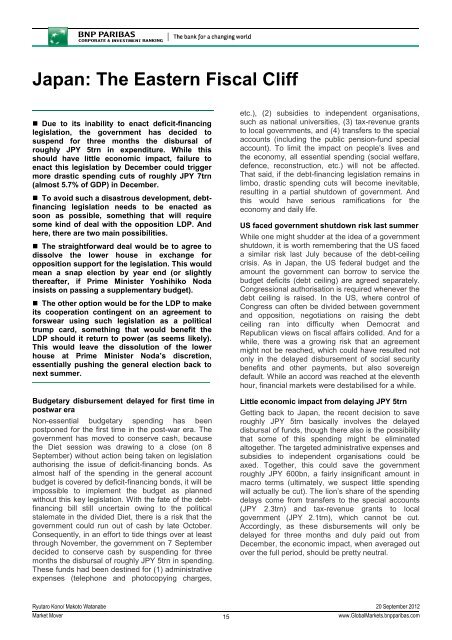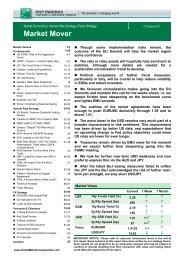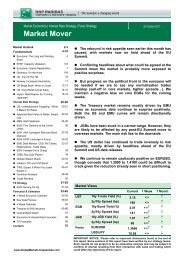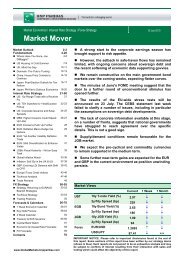MARKET MOVER - BNP PARIBAS - Investment Services India
MARKET MOVER - BNP PARIBAS - Investment Services India
MARKET MOVER - BNP PARIBAS - Investment Services India
You also want an ePaper? Increase the reach of your titles
YUMPU automatically turns print PDFs into web optimized ePapers that Google loves.
Japan: The Eastern Fiscal Cliff<br />
• Due to its inability to enact deficit-financing<br />
legislation, the government has decided to<br />
suspend for three months the disbursal of<br />
roughly JPY 5trn in expenditure. While this<br />
should have little economic impact, failure to<br />
enact this legislation by December could trigger<br />
more drastic spending cuts of roughly JPY 7trn<br />
(almost 5.7% of GDP) in December.<br />
• To avoid such a disastrous development, debtfinancing<br />
legislation needs to be enacted as<br />
soon as possible, something that will require<br />
some kind of deal with the opposition LDP. And<br />
here, there are two main possibilities.<br />
• The straightforward deal would be to agree to<br />
dissolve the lower house in exchange for<br />
opposition support for the legislation. This would<br />
mean a snap election by year end (or slightly<br />
thereafter, if Prime Minister Yoshihiko Noda<br />
insists on passing a supplementary budget).<br />
• The other option would be for the LDP to make<br />
its cooperation contingent on an agreement to<br />
forswear using such legislation as a political<br />
trump card, something that would benefit the<br />
LDP should it return to power (as seems likely).<br />
This would leave the dissolution of the lower<br />
house at Prime Minister Noda’s discretion,<br />
essentially pushing the general election back to<br />
next summer.<br />
Budgetary disbursement delayed for first time in<br />
postwar era<br />
Non-essential budgetary spending has been<br />
postponed for the first time in the post-war era. The<br />
government has moved to conserve cash, because<br />
the Diet session was drawing to a close (on 8<br />
September) without action being taken on legislation<br />
authorising the issue of deficit-financing bonds. As<br />
almost half of the spending in the general account<br />
budget is covered by deficit-financing bonds, it will be<br />
impossible to implement the budget as planned<br />
without this key legislation. With the fate of the debtfinancing<br />
bill still uncertain owing to the political<br />
stalemate in the divided Diet, there is a risk that the<br />
government could run out of cash by late October.<br />
Consequently, in an effort to tide things over at least<br />
through November, the government on 7 September<br />
decided to conserve cash by suspending for three<br />
months the disbursal of roughly JPY 5trn in spending.<br />
These funds had been destined for (1) administrative<br />
expenses (telephone and photocopying charges,<br />
etc.), (2) subsidies to independent organisations,<br />
such as national universities, (3) tax-revenue grants<br />
to local governments, and (4) transfers to the special<br />
accounts (including the public pension-fund special<br />
account). To limit the impact on people’s lives and<br />
the economy, all essential spending (social welfare,<br />
defence, reconstruction, etc.) will not be affected.<br />
That said, if the debt-financing legislation remains in<br />
limbo, drastic spending cuts will become inevitable,<br />
resulting in a partial shutdown of government. And<br />
this would have serious ramifications for the<br />
economy and daily life.<br />
US faced government shutdown risk last summer<br />
While one might shudder at the idea of a government<br />
shutdown, it is worth remembering that the US faced<br />
a similar risk last July because of the debt-ceiling<br />
crisis. As in Japan, the US federal budget and the<br />
amount the government can borrow to service the<br />
budget deficits (debt ceiling) are agreed separately.<br />
Congressional authorisation is required whenever the<br />
debt ceiling is raised. In the US, where control of<br />
Congress can often be divided between government<br />
and opposition, negotiations on raising the debt<br />
ceiling ran into difficulty when Democrat and<br />
Republican views on fiscal affairs collided. And for a<br />
while, there was a growing risk that an agreement<br />
might not be reached, which could have resulted not<br />
only in the delayed disbursement of social security<br />
benefits and other payments, but also sovereign<br />
default. While an accord was reached at the eleventh<br />
hour, financial markets were destabilised for a while.<br />
Little economic impact from delaying JPY 5trn<br />
Getting back to Japan, the recent decision to save<br />
roughly JPY 5trn basically involves the delayed<br />
disbursal of funds, though there also is the possibility<br />
that some of this spending might be eliminated<br />
altogether. The targeted administrative expenses and<br />
subsidies to independent organisations could be<br />
axed. Together, this could save the government<br />
roughly JPY 600bn, a fairly insignificant amount in<br />
macro terms (ultimately, we suspect little spending<br />
will actually be cut). The lion’s share of the spending<br />
delays come from transfers to the special accounts<br />
(JPY 2.3trn) and tax-revenue grants to local<br />
government (JPY 2.1trn), which cannot be cut.<br />
Accordingly, as these disbursements will only be<br />
delayed for three months and duly paid out from<br />
December, the economic impact, when averaged out<br />
over the full period, should be pretty neutral.<br />
Ryutaro Kono/ Makoto Watanabe 20 September 2012<br />
Market Mover<br />
15<br />
www.GlobalMarkets.bnpparibas.com
















